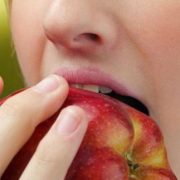If certain foods make your mouth itchy, it could be oral allergy syndrome
Some foods have proteins similar to those found in common allergens. Not sure which fruits and veggies to pick to avoid an itchy mouth? An oral allergy chart can help you figure out the culprits.
- by Jenn Savedge, Mother Nature Network, October 17, 2017*

Photo: Adam Melnyk/Shutterstock
My husband and I don’t have seasonal allergies, so while this may sound like we are as thickheaded as they come, we did not realize that our youngest daughter did have allergies — a really severe case — until she was around 4 years old. We just thought she came down with a terrible cold every spring. And when she told us that certain foods made her throat feel itchy, we thought she was just trying to get out of eating her fruits and veggies.
Fortunately, her allergist set us straight. In addition to her seasonal allergies, our daughter experiences oral allergy syndrome, a condition that causes an itchy or tingly feeling in the lips, mouth, throat, face and tongue. Oral allergy syndrome occurs when foods that have a protein that is similar to a protein found in an offending allergen are eaten by an allergy sufferer.
When Your Fruit Bites Back – Oral Allergy Syndrome by Jodi Holland, RD
For example, if you are allergic to birch pollen, you may experience oral allergy syndrome when eating foods such as apples, carrots, cherries, peaches or celery. The American Academy of Allergy Asthma and Immunology estimates that roughly 50 to 75 percent of adults who are allergic to birch pollen experience these symptoms. On the other hand, those who are affected by ragweed are most likely to feel oral allergy syndrome symptoms when eating foods such as bananas, cantaloupe or cucumber.
Here is a list of some of the most common offenders that affect people with oral allergy syndrome:
| Spring | Summer | Late Summer/Fall | Fall | |
| Birch | Timothy and Orchard Grass |
Ragweed | Mugwort | |
| Fruits and Veggies | ||||
| Apples | 🔴 | |||
| Apricot | 🔴 | |||
| Banana | 🔴 | |||
| Bell Pepper | 🔴 | |||
| Broccoli | 🔴 | |||
| Cabbage | 🔴 | |||
| Cantaloupe | 🔴 | |||
| Cauliflower | 🔴 | |||
| Carrot | 🔴 | |||
| Celery | 🔴 | |||
| Chard | 🔴 | |||
| Cherry | 🔴 | |||
| Cucumber | 🔴 | |||
| Garlic | 🔴 | |||
| Honeydew | 🔴 | |||
| Kiwi | 🔴 | |||
| Onion | 🔴 | |||
| Orange | 🔴 | |||
| Parsley | 🔴 | 🔴 | ||
| Peach | 🔴 | 🔴 | ||
| Pear | 🔴 | |||
| Plum | 🔴 | |||
| Tomato | 🔴 | |||
| Watermelon | 🔴 | 🔴 | ||
| White Potato | 🔴 | 🔴 | ||
| Zucchini | 🔴 | |||
| Spices | ||||
| Aniseed | 🔴 | |||
| Black Pepper | 🔴 | |||
| Caraway | 🔴 | |||
| Coriander | 🔴 | |||
| Fennel | 🔴 | |||
| Nuts and Legumes (These symptoms could also be the result of a more serious food allergy) | ||||
| Almond | 🔴 | |||
| Hazlenut | 🔴 | |||
| Peanut | 🔴 | |||
| Soybean | 🔴 | |||
| Source: American Academy of Allergy, Asthma, and Immunology | ||||
Oral allergy syndrome does not usually affect children (although my daughter would beg to differ). Symptoms can be managed by avoiding foods that cause a response or by cooking them — raw and unpeeled foods are more likely to cause a reaction than cooked, peeled or canned.
For most people, symptoms are limited to itching in the mouth and throat. But if your symptoms continue to get worse, if they are accompanied by hives, nausea or difficulty breathing, or if they occur when eating nuts, you should check in with your doc. According to the Mayo Clinic, roughly 1 to 2 percent of cases result in symptoms serious enough that they necessitate an emergency room visit.
Read original article at https://www.mnn.com/health/allergies/blogs/oral-allergy-syndrome-certain-foods-make-your-mouth-itchy








